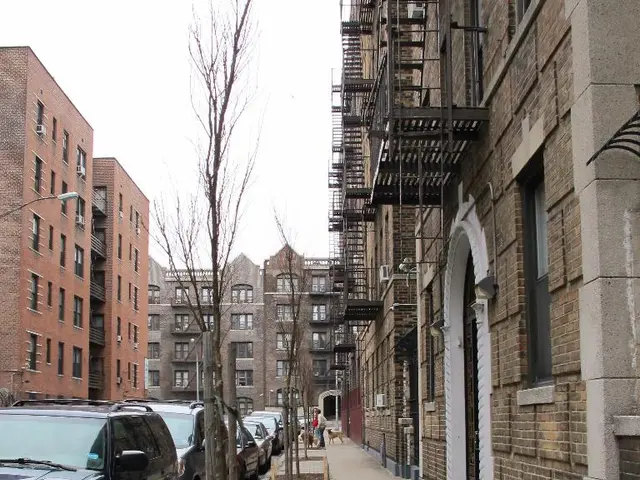Finance Industry Focused on Environmental Sustainability Under Scrutiny
Lived and Learned: Sustainable Finance Bears the Trump Test
Sustainable finance has found itself in the hot seat recently, particularly due to the revival of anti-green rhetoric north of the border. Despite some hurdles, organizers of the Sustainable Finance Summit, taking place in Montreal this Tuesday, remain positive about the sector's resilience.
"The winds of change are tugging against sustainable finance," concedes Florian Roulle, Vice-President of Finance Montreal, in an interview with Le Devoir. But the climate and environmental crisis is still very much a reality, he underlines swiftly.
Geneviève Morin, CEO of Fondaction, also acknowledges "the mounting pressure" against the industry. "We can't pretend, act like everything's hunky-dory," she admits.
A notable setback occurred in late April when Canadian financial authorities put their plan to introduce a regulation requiring Canadian companies listed on the stock exchange to disclose climate change-related information, like their greenhouse gas emissions, on hold. The reason given? "The rapid and major upheavals" in the global economy and geopolitics in light of "recent events in the United States." Simply put, President Donald Trump's all-out trade war and his pledge to deregulate the fossil fuel sector have created too much uncertainty.
Another blow to sustainable finance came from the Royal Bank of Canada, which recently announced it was backing away from several of its climate commitments. Canada's largest financial institution justified this retreat by citing a desire to comply with new anti-greenwashing rules, enshrined in the Competition Act.
Green Shoots Amid Dark Clouds
Despite these setbacks, Florian Roulle and Geneviève Morin are hopeful. "At first, when President Trump was elected, our instinct was to retreat and continue our work more covertly," Ms. Morin reflects.
"But now, it seems that we are becoming more emboldened. It's not some trendy activism, it's not politics. It's science," she believes.
The Montreal financial scene remains "deeply engaged," notes Mr. Roulle. "A few years ago, Montreal was at position 30 among global green and sustainable financial hubs. We've moved up to position 10 worldwide and first in North America," he mentions.
Even without mandatory disclosure of environmental efforts, companies and financial institutions continue to advance, observes Ms. Morin. For instance, small to medium-sized enterprises keen on diversifying their European supply chains must abide by stricter Old World environmental regulations.
In her opinion, the current ebbs and flows are temporary but the underlying trend remains, and disclosure obligations will eventually come. "I'd rather have it happen gradually but solidly, and for people to have faith in it," says Ms. Morin.
The Sustainable Finance Summit will be held at the New City Gas complex in Montreal and will last for three days, from Tuesday to Thursday. An estimated 1000 participants are expected, with more than 80 panelists present.
On a Related Note- Melanie Joly, who seemed guaranteed a spot in foreign affairs, unexpectedly inherits industry.- The odds in Terrebonne were tied between a Bloc Quebecois voter and a candidate from the Liberal Party of Canada. A mail-in vote from a Bloc Quebecois supporter could have tilted the scales.- Asylum seekers in Quebec should prepare for a long wait. At least seven years must pass before they can qualify for permanent residency.
Worth Checking Out- In video: A closer look at the impact of Donald Trump's policies on sustainable finance in Canada.
Further Insights- The impact of Donald Trump's trade policies on sustainable finance in Canada can be understood through several key factors.
- Economic Instability: The trade war has introduced instability in Canada's economy, potentially affecting investments in sustainable sectors.
- Regulatory Challenges: Delays in regulatory approvals, such as for mining projects, could impede Canada's ability to exploit essential minerals for sustainable technologies.
- Diversification Need: The trade war underscores the importance of diversifying Canada's export markets beyond the U.S., which could drive more focus on sustainable sectors.
- Environmental Concerns: Reduced regulatory oversight could result in relaxed environmental standards, jeopardizing sustainable finance initiatives.
- Innovation and Investment: Deregulation could stimulate innovation and entrepreneurship, essential for developing sustainable technologies.
- Policy Response: Canada's response to the trade war emphasizes the need for robust policy changes, such as boosting private sector productivity and competitiveness, potentially integrating sustainable finance into broader economic strategies.
In essence, while Donald Trump's trade policies pose challenges for Canada, these challenges also present opportunities for Canada to focus on sustainable finance by diversifying its markets and investing in sustainable sectors. However, the impact of deregulation on sustainable finance is complex and requires careful consideration of environmental and economic goals.
The government's decision to postpone the regulation requiring disclosure of climate change-related information has been influenced by the economic instability caused by President Trump's all-out trade war and his pledge to deregulate the fossil fuel sector. Nevertheless, Geneviève Morin believes that the current difficulties faced by sustainable finance are temporary, and she remains hopeful about the sector's future, attributing it to science and the importance of environmental-science in addressing climate-change. Florian Roulle agrees, pointing out the progress made by Montreal in establishing itself as a global hub for green and sustainable financial activities.





